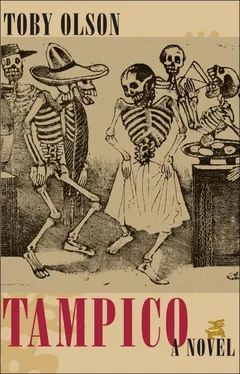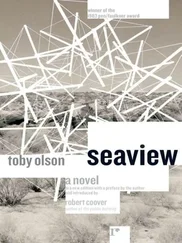“Down at the end, next to my place,” James said, then turned in his robe, and I heard the rubber tip of his cane squeak and echo softly on the stone floor, then felt Andy passing from behind me and coming to his side. He was carrying his silk shirt and held something else, a small plastic cup, in his other hand.
“Medication,” he said brightly, and James looked at him, hollow-eyed and grinning, then looked at us.
“Such a cheery fucker,” he said weakly, and Carlos laughed, and I saw a man at the high table pause as he fanned his cards.
“Come on,” James said, “it’s time for rest now,” and he turned and shuffled off across the carpets toward the chapel’s end, Andy behind and watching him, and we followed, and when we reached his carved door, he opened it and stepped inside the dark room and we saw his palm over his shoulder, his fingers waving, as he said good-bye. Andy reached in front of us and closed the door, then held his hand up, indicating that we should wait there, and moved to the next door in the wall and knocked softly.
“The players,” Carlos said. “Maybe there’s something there?”
I nodded, and he stepped away from me, and I watched as he angled off toward the altar. The men saw him coming and lowered their cards to the table. Their eyes in their skull faces were on him, and I saw the dog looking too. Then Andy was motioning to me, and I moved along the wall to the open door where he was waiting, and when I turned in the frame he touched me lightly on the arm, then was gone.
There was light in the room, frayed shafts of filtered street light coming through panels of stained glass and pooling in dim rainbow colors on the stone floor, and through the dust motes in the shafts I could see a bank of file cabinets on the far wall under the windows rising to chest level and the wavy images of objects on the metal, coffee cups and trays, a stack of game boxes, the half-finished model of a clipper ship. The floor was bare stone, no rugs, and to the left, in front of stacks of metal chairs against the wall, I saw the dull surface of a large wooden table, chairs around it, and a water cooler off in a corner. The open door blocked my view of the right side of the room, but I could hear a faint metallic whistling beyond it, could see evidence of another light source, the edge of a dead white crescent on the floor, and could smell coffee and hear the pot coughing. Then I heard another cough, a gurgling in some mechanism, and words forming within it, “Come in, come in.”
I stepped into the room, beyond the door’s edge, then came to the pool of colored light and stepped into that, then turned and saw the arms and hands of the figure and his torso. The hands turned a deck of cards, then shuffled them over the typewriter table at the end of which was a small lamp and a coffee cup and an ashtray holding a half-smoked joint of marijuana. He was leaning back slightly, his head in darkness, and I could see the robe like a white skirt hanging from his knees and his thin bare shins and ankles and the white cotton slippers on his feet on the stone floor. His hand turned, the deck in his palm, and I heard that gurgling again. It was coming from his thin chest, and I thought I could see his heart beating close to the surface, pushing through the robe at the side of his sternum. Then the words were in the air and his hand was gesturing toward a metal chair across from him, “Sit down,” and I moved to the chair and did so. Then I could see light on his neck and chin, the hole in the tracheotomy tube in his throat, and then he was leaning forward and I could see his face constructing itself as it came into the light, a bony armature over which skin had been stretched, then some abstraction of planes and angles, then the common face of an old man and the specifics of personality in the thin mustache and lips, the deep blue of his eyes, and the lowering and slight cocking of his chin as his words came up from that controlled belching.
“Larry Paradise,” he said. “And you?”
“I’m Peter Blue,” I said.
“And you’re here about Gordon, I understand. That’s what Andy said. Some coffee? A little dope?”
He gestured over his shoulder to where the pot was, on a table back in the darkness. My eyes were getting accustomed to the dim light and I could see the thin cot now, a legal pad and pencil on the pillow. I started to refuse, then realized he wanted coffee, and I got up and moved around him and stepped to the table and the pot, and when I turned, holding it, I could see his scapulas through the white robe, and the thickness of his brown hair.
“Not for long,” he said, his voice muffled, the words half formed.
“What?” I said, pouring the coffee.
He gestured for me to leave the pot, and I lowered it to the table beside the lamp, then sat down across from him again. He lifted the cup and sipped from it.
“My hair,” he said. “I’m on the chemo just a few days ago.” His eyes were lowered to the cup when he spoke again. “You’ve got it, haven’t you?”
I knew exactly what he meant, though I couldn’t figure how he could know, and I was more curious about that than about his asking.
“Yes,” I said. “For a year and a half now as I figure it.”
“I haven’t,” he said. “But what the fuck difference does it make now? I’m an old man. I’ve had it in the throat, now it’s in the liver. They seem to like to find it. Their profession? But it’s still just the common cancer. Not Gordon. He wasn’t like that.“
“But this place,” I said. “Isn’t it a hospice?”
“And you’re wondering why I’m here,” he said. “But I worked with Gordon, and people know about that. I’m only here temporarily. Just for a week or so.”
“You were his lover?”
“Christ no!” he laughed, his thin shoulders shaking. “But that’s an idea. I could have been his grandfather. I had forty years on him.”
“But was there a lover?” I asked.
“Look,” he said. “You’re going to hear that everywhere. Necessary rumor. He was a very public man, and he was gay, and he had AIDS. But there was a good, hefty policy, you know, and there was the manuscript collection, what was left of it. I was executor, and I turned it all over. I turned the job over too, when they found the cancer. But it wasn’t really the money. He was a force you see, and that’s the loss.”
I told him about the job, that Strickland had hired me for that museum trip to Boston, a sale of his materials.
“That’s certainly probable,” he said. “You see, that’s where the money came from. He wasn’t really all that rich, but he had that collection. And he was selling it, bit by bit. He’d work up some matching grant or other, then he’d sell something and donate the money as a gesture. And that would lay some guilt on the others, politicians and the wealthy. He was strategic about it. He had some choice stuff in Orleans.”
“Were you ever there?” I said.
“In Orleans? No. No, I wasn’t. And when he was there he didn’t visit me either. It was our agreement. And he was ill and needed that rest. His work was very important, and it gave me something important too for a while. I’m an old man now, and meaning comes hard.”
“He didn’t visit?” I said. “How could that be? Don’t you live here, in Philadelphia?”
“Fuck no,” he said. “I live at the Manor.”
“You mean, in Provincetown?”
“Not exactly,” he said. “In Truro.”
“Of course,” I said, thinking of Carlos and how close I’d been to this man, just a few yards beyond the solarium screen when I’d visited.
“The lists,” I said. “The missing stuff. Can you tell me about that?”
It had grown chilly in the room, and I pointed to his cup as I spoke. I wanted coffee myself now, and I rose and went back to the table near the bed. I could feel a dampness at my collar, a breeze blowing in from somewhere, and I buttoned the top button. He was talking, filling in the background of his time with Strickland, that he had been his secretary, just for the AIDS patients, a traveling secretary, on hand for house visits and for the setting up and administering of hospices around the city. He spoke of the irony of this one, a chapel connected to a bar, of the Catholic Church and of condoms, needle exchanges and Strickland’s involvement in the writing and dissemination of information about safe sex. I thought he might be getting to the question of the lists, and I was thinking of Sara, my lost wife, and about Beth, Charlie’s daughter, who had died before love, and I found myself standing at the table behind him, holding the cup, his voice muffled as it drifted back over his shoulders. I think I turned then, and I can remember my body shaking, just the skin and muscle, as if I were the bones inside my body and the covering flesh were garments. They seemed to swell out from the bones as I stepped around him and moved back to the chair. He was still talking, of Carlos now and the table in the kitchen in Provincetown, and of the lighthouse, and I was sitting down at the table and he was holding the pot, and I held my cup out for him to fill it. But the cup was lowering in my hand, and I couldn’t hold it up, and I was watching my extended arm and my hand and the cup as I sat down. But the chair was gone and I was falling and the cup was falling and I saw bands of filtered light, colorful, then fading as I continued to fall. Then darkness was coming in over me, and he was speaking of manuscripts and of the smell of something clotted in the room and of Tampico and a plane lifting up from a dirt runway, and I was falling back in the seat as the plane rose, entering into a night of a thousand bright stars, and someone was reaching out for me in some vague sexuality and I was warning them away, and we were going somewhere.
Читать дальше












